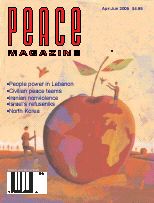
Peace Magazine Apr-Jun 2005, page 5. Some rights reserved.
Search for other articles by Maxine Nash here
Search for other articles by Norman Epstein here
I read a report today from a Quaker therapist who works with returning US soldiers and their families. The therapist noted that the returning soldiers are feeling that they've lost an important part of themselves because of the actions they've done in Iraq, and fear they are damaged permanently by behaving against their core beliefs. The therapist also mentioned that most of the soldiers returning from Iraq are angry, and that the anger seems to be a necessity to staying alive in Iraq.
I've met these soldiers here in Iraq. I've met the one who seems angry all the time, with a permanently-etched scowl on his face. I've met the one who tells me of doing things he didn't want to do and then telling me the ways he tries to cope with those actions. I've met the one who seems to have turned off all emotion in order not to feel anything. I've met the one who, when he got back home, said he'd done his time in Hell and he wasn't ever going back.
How can they un-live everything that's happened to them in this crazy situation and get back to being whole human beings again? The answer is, of course, that they can't ever undo what they've seen and done as soldiers. No one can give them back the innocence they had before coming here.
The same is true for me. I lost innocence that I didn't know I had. I found out that my government and its military have condoned incredible acts of violence, often against civilians. I've learned that my government thinks very little about basic humanitarian rules of conduct and that my government's military was woefully ignorant of those rules in the first place. I've learned that all of this can somehow be justified with a large portion of the American public in the name of "the war on terror."
Maxine Nash, Baghdad
I'd like to point out some misrepresentations, misunderstandings, and perhaps some naïveté in your brief to Foreign Affairs Canada (Peace Magazine Jan-Mar 2005, page 22).
The security fence (96% is fence, not wall) was a desperate measure to prevent suicide bombers from infiltrating into Israel proper. It has been largely effective. The Arab league and its allies, mostly totalitarian re-gimes, asked the Interna-tional Court of Justice (ICJ) to rule "that seeing the wall is illegal, what measures can the international community take?"
The resolution passed in the General Assembly with a significant num-ber of abstentions -- Canada being one of them. Very few, if any, democracies voted for the case to be heard. In fact, over 30 democracies including Canada presented briefs to the ICJ saying this was inappropriate. The issue was political and should be set-tled politically and should be based on UN Security Resolutions 242 and 338, which advocate trading land for peace and security. The Israeli Supreme Court has issued a judgment that the path of the fence must be re-routed in order not to cause inordinate hardships to Palestinians.
Easily a majority of Israelis (poll after poll) would be willing to give back much of the disputed territory for peace. Why the need for terrorism? Because the mandate of many of these "militant groups," including Fatah, is the replacement of Israel with an Arab State --not compromise.
The Israel-Arab conflict is not the cause of generating new terrorists. If that were the case, why were there bombings against Western-ers in Riyadh, Morocco, Bali, Spain, and so forth?
It is a clash of ideologies. Israel is a western democ-racy on the frontlines. These regimes that subjugate their people -- denying them opportunity, education, and economic stabi-lity -- provide fertile ground for extremists to recruit the young, the disillusioned, and the disenfranchised, and fill them with a distorted view of a very noble religion.
Norman Epstein, Toronto

Peace Magazine Apr-Jun 2005, page 5. Some rights reserved.
Search for other articles by Maxine Nash here
Search for other articles by Norman Epstein here